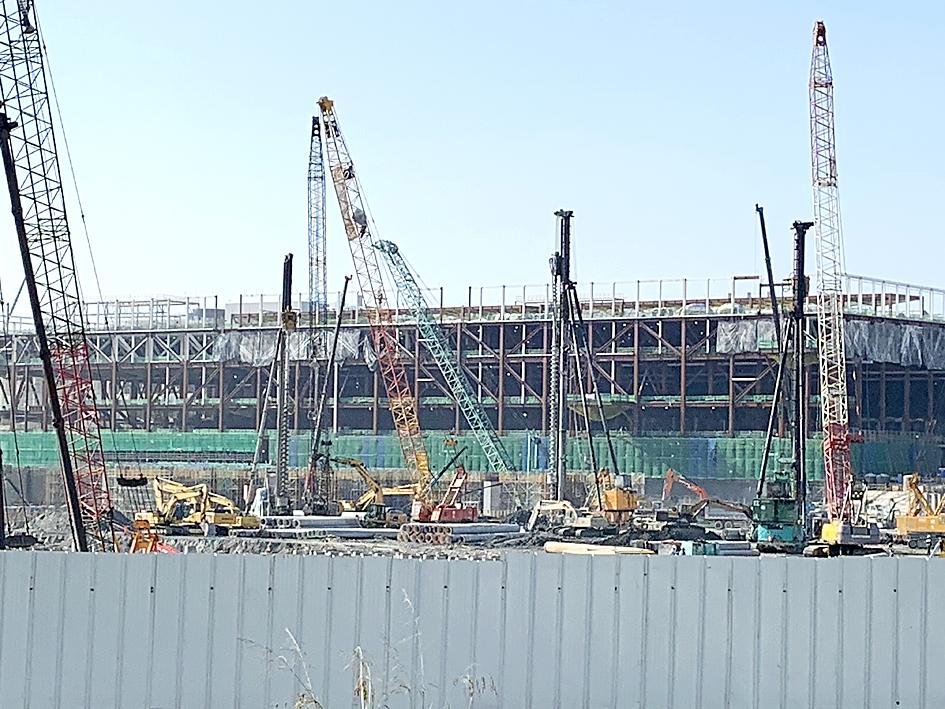Taiwan and China are to build more new high-volume semiconductor fabrication plants this year and next year than any other country, together contributing more than half of all new fabs in the world by constructing eight each, SEMI said in a quarterly report yesterday.
Global chipmakers are to start building 19 new high-volume fabs by the end of this year and another 10 next year to meet accelerating demand for chips from the communications, computing, healthcare, online services and automotive sectors, SEMI, an association that represents the global semiconductor sector, said in its quarterly report.
“Equipment spending for these 29 fabs is expected to surpass US$140 billion over the next few years, as the industry pushes to address the global chip shortage,” SEMI president and chief executive officer Ajit Manocha said.

Photo: Grace Hung, Taipei Times
“In the medium and longer term, the fab capacity expansion will help meet projected strong demand for semiconductors stemming from emerging applications such as autonomous vehicles, artificial intelligence, high-performance computing and 5G to 6G communications,” Manocha said.
China and Taiwan would lead the way with eight fabs each, followed by the Americas with six, Europe and the Middle East with three combined, and Japan and South Korea with two each, the report said.
In Taiwan, chipmakers such as Taiwan Semiconductor Manufacturing Co (TSMC, 台積電), Powerchip Semiconductor Manufacturing Co (力積電) and Vanguard International Semiconductor Corp (世界先進) are investing in new foundry fabs, SEMI said.
TSMC has raised its capital spending budget for this year to a record US$30 billion, and Vanguard, which makes driver ICs for displays and power management ICs, also boosted its capital expenditure for this year by 41 percent to NT$8.5 billion, while Powerchip in March started building a new 300mm fab with an initial investment of NT$278 million.
Chinese semiconductor firms are investing in fabs that make memory chips, foundry or auto chips, rather than advanced chips, SEMI said.
Fabs that produce 300mm wafers would account for most of the new facilities, with construction beginning on 15 fabs this year and seven others next year, SEMI said.
The remaining seven fabs planned over the two-year period would be 100mm, 150mm and 200mm facilities, it added.
The 29 fabs could produce as many as 2.6 million wafers per month in 200m equivalents, the report said.
Of the semiconductor makers beginning construction of new fabs this year, some would start installing equipment next year, but most would not do so until 2023, the report added.

Semiconductor shares in China surged yesterday after Reuters reported the US had ordered chipmaking giant Taiwan Semiconductor Manufacturing Co (TSMC, 台積電) to halt shipments of advanced chips to Chinese customers, which investors believe could accelerate Beijing’s self-reliance efforts. TSMC yesterday started to suspend shipments of certain sophisticated chips to some Chinese clients after receiving a letter from the US Department of Commerce imposing export restrictions on those products, Reuters reported on Sunday, citing an unnamed source. The US imposed export restrictions on TSMC’s 7-nanometer or more advanced designs, Reuters reported. Investors figured that would encourage authorities to support China’s industry and bought shares

FLEXIBLE: Taiwan can develop its own ground station equipment, and has highly competitive manufacturers and suppliers with diversified production, the MOEA said The Ministry of Economic Affairs (MOEA) yesterday disputed reports that suppliers to US-based Space Exploration Technologies Corp (SpaceX) had been asked to move production out of Taiwan. Reuters had reported on Tuesday last week that Elon Musk-owned SpaceX had asked their manufacturers to produce outside of Taiwan given geopolitical risks and that at least one Taiwanese supplier had been pushed to relocate production to Vietnam. SpaceX’s requests place a renewed focus on the contentious relationship Musk has had with Taiwan, especially after he said last year that Taiwan is an “integral part” of China, sparking sharp criticism from Taiwanese authorities. The ministry said

US President Joe Biden’s administration is racing to complete CHIPS and Science Act agreements with companies such as Intel Corp and Samsung Electronics Co, aiming to shore up one of its signature initiatives before US president-elect Donald Trump enters the White House. The US Department of Commerce has allocated more than 90 percent of the US$39 billion in grants under the act, a landmark law enacted in 2022 designed to rebuild the domestic chip industry. However, the agency has only announced one binding agreement so far. The next two months would prove critical for more than 20 companies still in the process

CHANGING JAPAN: Nvidia-powered AI services over cellular networks ‘will result in an artificial intelligence grid that runs across Japan,’ Nvidia’s Jensen Huang said Softbank Group Corp would be the first to build a supercomputer with chips using Nvidia Corp’s new Blackwell design, a demonstration of the Japanese company’s ambitions to catch up on artificial intelligence (AI). The group’s telecom unit, Softbank Corp, plans to build Japan’s most powerful AI supercomputer to support local services, it said. That computer would be based on Nvidia’s DGX B200 product, which combines computer processors with so-called AI accelerator chips. A follow-up effort will feature Grace Blackwell, a more advanced version, the company said. The announcement indicates that Softbank Group, which until early 2019 owned 4.9 percent of Nvidia, has secured a